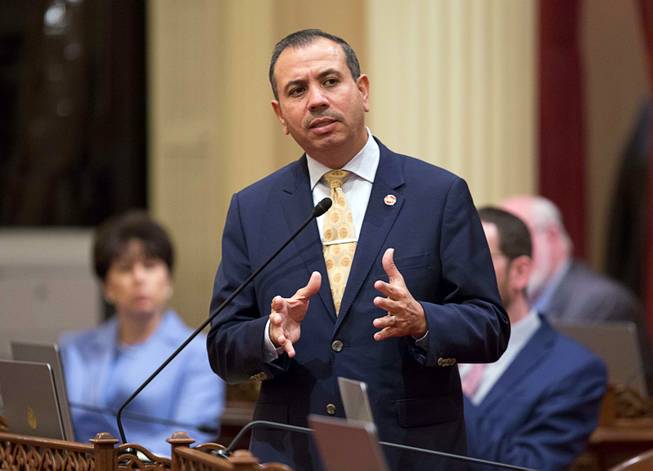
Steve Yeater / AP
In this Jan. 3, 2018, file photo, California state Sen. Tony Mendoza, D-Artesia, announces that he will take a month-long leave of absence while an investigation into sexual misconduct allegations against him are completed in Sacramento, Calif. When lawmakers return from the President’s Day weekend, Tuesday, Feb. 22, 2018, they will learn whether the investigation cleared Mendoza or sets him up for possible expulsion.
Friday, Feb. 23, 2018 | 12:45 a.m.
SACRAMENTO, Calif. — Critics cite a state senator's dramatic resignation in highlighting the work to be done to change the culture of sexual misconduct in the California Legislature.
Sen. Tony Mendoza succumbed to months of mounting tension over sexual misconduct allegations Thursday, resigning his position as he was about to face a potential vote on his expulsion.
His scathing letter called the investigation into his conduct a farce and underscored the Legislature's struggle to respond to the #MeToo movement.
Last fall, millions of women on social media shared their experiences with sexual harassment and assault in the workplace. Dozens of women who work at the Capitol joined the movement by sending a letter calling for a change to the California Legislature.
Claims were made against a handful of lawmakers with allegations including sexual misconduct as well as retaliation.
An investigation found that Mendoza likely engaged in unwanted "flirtatious or sexually suggestive" behavior with six women, including four subordinates, a lobbyist and a young woman in a fellowship with another lawmaker.
Lawyers who conducted the investigation released Tuesday found that Mendoza "more likely than not" engaged in behavior such as offering a 19-year-old intern alcohol in a hotel suite at a Democratic event, suggesting a young woman in a Senate fellowship take a vacation with him and rent a room in his house, and asking several women about their romantic lives.
Mendoza, who is 46 and married, said in his resignation letter that "more likely than not" was a low standard of proof that didn't merit a penalty as high as expulsion. He added that he wasn't able to see the evidence against him and was ordered to remain silent about the allegations.
Mendoza's resignation was the best solution for the women who accused him of misconduct, but it hasn't delivered justice or due process, said Samantha Corbin, a lobbyist and co-founder of a group called We Said Enough that formed in the wake of the letter sent by female Capitol workers.
The Legislature still hasn't adopted fair and transparent policies for sexual misconduct, Corbin said.
"There's a lot of room for interpretation, there's a lot of ambiguity, and it does neither the victims nor the perpetrators any type of justice," she said. "It's unfair for everyone."
Some say objectivity must be improved.
"Removing senators from the process of deciding cases of sexual harassment involving their friends and roommates is imperative," said Sen. Andy Vidak, a Republican who first moved to expel Mendoza in January. "The Mendoza mess has brought to light all of the flaws of our sexual harassment policies but hopefully will lead us to some resolution."
Mendoza wrote that he couldn't get a fair hearing with so many of his fellow Democrats running for higher office and thinking about their own political futures.
He took aim at the leader of the Senate, a fellow Democrat and his former roommate in Sacramento who moved out and ultimately led the effort to remove him from the Legislature.
"It is clear that Senate President Pro Tem Kevin de Leon will not rest until he has my head on a platter to convince the MeToo movement of his 'sincerity' in supporting the MeToo cause," Mendoza wrote.
De Leon, who is running for the U.S. Senate seat held by Democrat Dianne Feinstein, said the Legislature "won't tolerate abuse of power and a pattern of behavior that violates our harassment standards."
Leaders of the Legislative Women's Caucus said more work remains to be done to ensure clear sexual harassment policies. Assemblywoman Susan Talamantes Eggman and Sen. Connie Leyva said the Legislature must ensure harassment claims are dealt with transparently and "no one is beyond reproach."
Elected officials need to hold themselves to a higher standard, and the Senate doesn't need to hold itself to the same standard as a court of law, said Kim Nalder, director of the Project for an Informed Electorate at California State University, Sacramento.
"So long as there's a process that's transparent and rigorous, that's what we should expect of them."
Mendoza is the third California lawmaker to resign recently over sexual misconduct allegations. Two other Los Angeles-area Democratic representatives, Raul Bocanegra and Matt Dababneh, resigned last fall. Assemblywoman Cristina Garcia has taken leave after she was accused of groping.
An investigation has concluded into Sen. Bob Hertzberg, whom at least three female colleagues say made them uncomfortable with hugs. The findings have not been made public.
